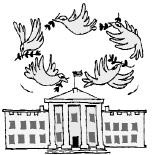THEY CAME IN BUSES, on trains, in car caravans. They took off their shoes at the airports (if they weren’t banned from flying by Bush’s goons) and then put them on again for the march. Jan. 18’s anti-war rally in Washington, by some euphoric estimates, drew half a million people.
They had company: up to 300,000 in San Francisco, 25,000 in Portland, 1,000-plus crowds in Tampa, Honolulu, Chicago, Atlanta, Minneapolis, Lincoln, Salt Lake City, Spokane, San Luis Obispo, Tucson, Albuquerque, Ann Arbor, Santa Barbara, Orange County (at the Nixon Library), and Milwaukee. In Montpelier, Vt., 3,000 people rallied in a town of 8,000. In the Seattle area, scores of “Peace Potlucks” overflowed homes and community centers. Two days later, Monday’s annual Martin Luther King Jr. Day march became the largest anti-war march in Seattle since the Gulf War, stretching some 20 blocks down Yesler Way.
Opposition to a U.S. invasion of Iraq is enormous and growing. It transcends the usual progressive choir, drawing countless people who never imagined they’d protest a war. Coalitions like Sound Nonviolent Opponents of War and Not in Our Name are diverse, vibrant, and wildly creative. And one question hangs over the entire exercise.
Will it work?
WAR OPPONENTS ARE sailing uncharted waters. There is no unifying ideology, no single organization rallying the anti-war troops. No major political leaders are voicing the opinions being mouthed by the protesters. Media coverage often has been sparse and patronizing, underreporting crowd sizes and treating opponents as more of a political sideshow than a major factor in whether America will invade.
In many ways, this country’s entire political establishment is missing the boat. While polls show Americans divided on the issue of war and Dubya’s approval ratings remain reasonably good, the depth of anger among Bush’s critics is remarkably strong. That anger has been a long time developing. Dubya is the natural outgrowth of trends that have been gaining power in American government for decades: the corporate influence, the arrogance, the intrusiveness, the lack of electoral choices or accountability. And people are sick of it. We want our democracy back.
It’s not entirely clear whether we can get it. Protest, in D.C. or Seattle, may, in fact, be a sideshow, ignored by the people who will make the decisions that count. Activists are trying to influence a public policy decision when there are virtually no decision makers on the inside, in either party, championing their views.
THEY JUST MIGHT succeed anyway. As the White House itself keeps insisting, an invasion of Iraq is not a foregone conclusion, even as the U.S. masses its soldiers for a prospective march to Baghdad. But while they muster, a number of factors are converging to potentially prevent their use. Arab nations are negotiating to have Saddam Hussein sent into exile. Bush faces skepticism or outright opposition from virtually every government in the world; at home, opponents include much of the Pentagon, including the Joint Chiefs of Staff. Invasion would be hugely expensive at a time of economic downturn and exploding budget deficits. And then there is the wild card of massive public opposition, globally and especially in the United States itself. Already, the White House is saying an attack likely would occur no sooner than March—to give U.N. inspectors more time and because it will take that long to have the military fully deployed.
Domestic public opposition is a wild card specifically because there’s no clear mechanism, short of elections, by which public opposition can influence any Washington decision, let alone one made in the bowels of the White House by an administration renowned for its secrecy and lust for power. But the flip side of a lust for power is the Bush cabal’s fear of losing it. That threat is the anti-war movement’s greatest leverage. In order to prevent an invasion of Iraq—and, beyond, the transformation of our country into a state of permanent war—the Bushies must be convinced, quite simply, that if they proceed, we’ll kick them out. And hawkish Democrats like Joe Lieberman must be convinced that they’ll be held to the same standard.
A PROTEST MOVEMENT has inherent value; we transform ourselves, whether we change public policy or not. But as the stakes grow bigger and the decision makers more distant, changing policies gets far harder. How could these protests lead to a decision to forgo war? Massive numbers of newly registered voters; a commitment to raising money and walking precincts; a vision, across the country, of turning out of power any politicians, in any party, who would turn our country into an America none of us wants.
It can be done; all the corporate money in the world cannot trump passion when enough people are deeply committed to a political goal. That goal must be the threat to remove Bush from power. Anything less, and all the millions that organizers can put in the streets may not matter.








